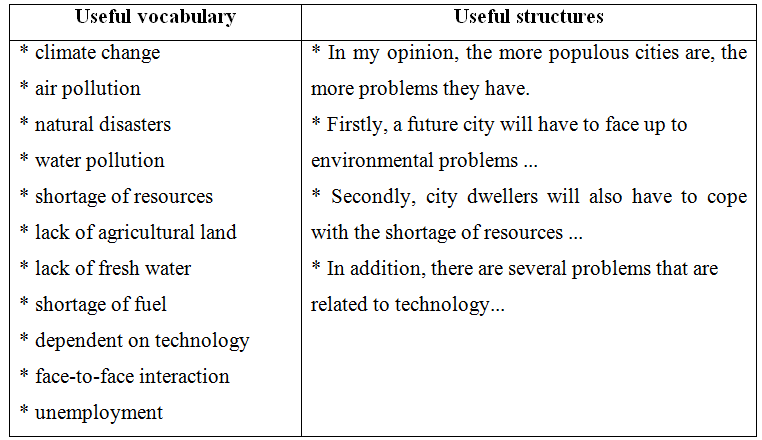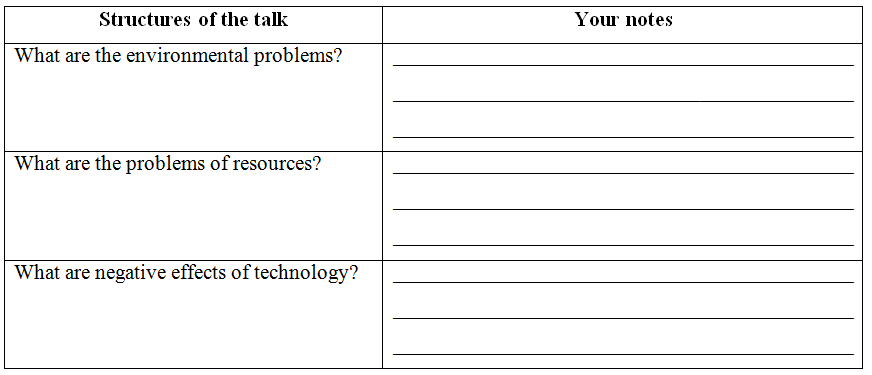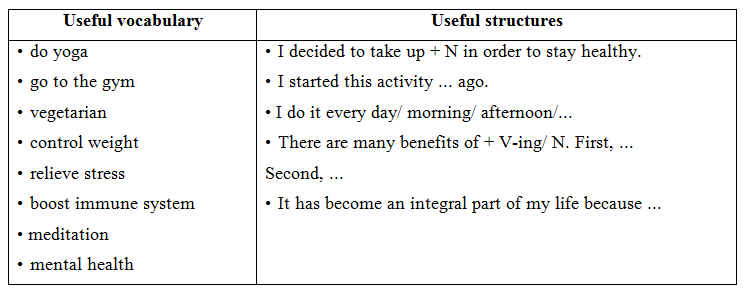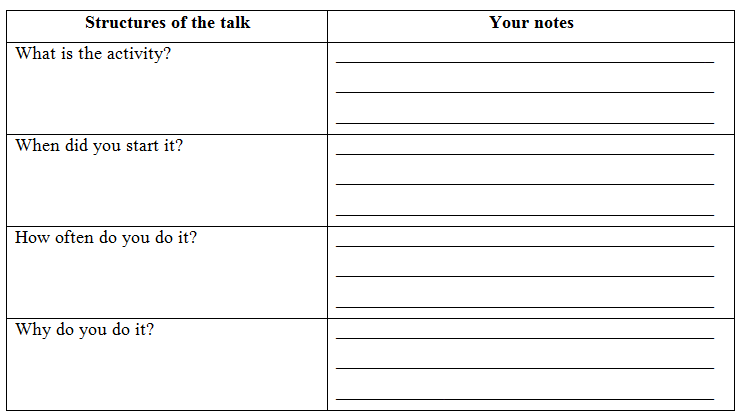Trả lời:
 Giải bởi Vietjack
Giải bởi Vietjack
Đáp án: aren’t
Giải thích: Xét về nghĩa, động từ “not - be” là phù hợp nhất. Thêm vào đó, việc “cây cối không thể phát triển” là kết quả hiển nhiên của việc “không có nước” nên ta dùng câu điều kiện loại 0, ta chia động từ to be trong mệnh đề chính ở thì hiện tại đơn là “aren’t” cho phù hợp với chủ ngữ đếm được số nhiều “plants”.
Dịch nghĩa: If there is no water, plants aren’t able to grow. (Nếu không có nước thì cây cối sẽ không thể phát triển được.)
Đáp án: aren’t
Giải thích: Xét về nghĩa, động từ “not - be” là phù hợp nhất. Thêm vào đó, việc “cây cối không thể phát triển” là kết quả hiển nhiên của việc “không có nước” nên ta dùng câu điều kiện loại 0, ta chia động từ to be trong mệnh đề chính ở thì hiện tại đơn là “aren’t” cho phù hợp với chủ ngữ đếm được số nhiều “plants”.
Dịch nghĩa: If there is no water, plants aren’t able to grow. (Nếu không có nước thì cây cối sẽ không thể phát triển được.)
CÂU HỎI HOT CÙNG CHỦ ĐỀ
Câu 1:
Talk about problems a city will have to face up to in the future.
You can use the following questions as cues:
• What are the environmental problems?
• What are the problems of resources?
• What are negative effects of technology?
Useful languages:

Complete the notes:

Now you try!
Give your answer using the following cues. You should speak for 1-2 minutes.
1. In my opinion, the more populous cities are, the more problems they have.
2. Firstly, a future city will have to face up to environmental problems ...
3. Secondly, city dwellers will also have to cope with the shortage of resources ...
4. In addition, there are several problems that are related to technology ...
Now you tick!
Did you ...
- answer all the questions in the task?
- give some details to each main point?
- speak slowly and fluently with only some hesitation?
- use vocabulary wide enough to talk about the topic?
- use various sentence structures (simple, compound, complex) accurately?
- pronounce correctly (vowels, consonants, stress, intonation)?
Let’s compare!
Finally, compare with the sample answer on page 190.
Talk about problems a city will have to face up to in the future.
You can use the following questions as cues:
• What are the environmental problems?
• What are the problems of resources?
• What are negative effects of technology?
Useful languages:

Complete the notes:

Now you try!
Give your answer using the following cues. You should speak for 1-2 minutes.
1. In my opinion, the more populous cities are, the more problems they have.
2. Firstly, a future city will have to face up to environmental problems ...
3. Secondly, city dwellers will also have to cope with the shortage of resources ...
4. In addition, there are several problems that are related to technology ...
Now you tick!
Did you ...
- answer all the questions in the task?
- give some details to each main point?
- speak slowly and fluently with only some hesitation?
- use vocabulary wide enough to talk about the topic?
- use various sentence structures (simple, compound, complex) accurately?
- pronounce correctly (vowels, consonants, stress, intonation)?
Let’s compare!
Finally, compare with the sample answer on page 190.
Câu 2:
4. In the future, cars equipped with on-board computers will be able to__________and avoid traffic jams automatically.
4. In the future, cars equipped with on-board computers will be able to__________and avoid traffic jams automatically.
Câu 3:
Listen and fill in the blanks with ONE appropriate words.
1. The global population is predicted to reach___________billion in the future.
Listen and fill in the blanks with ONE appropriate words.
1. The global population is predicted to reach___________billion in the future.
Câu 5:
7. If you want to raise rents, you have to__________the housing first.
7. If you want to raise rents, you have to__________the housing first.
Câu 8:
9. A: We should eat more fruit every day.
B: Fruit is good for health, isn’t it? ________
9. A: We should eat more fruit every day.
B: Fruit is good for health, isn’t it? ________Câu 10:
- Write an essay (150 -180 words) about improvements we will see in the cities in the future.
You can use the following questions as cues:
* How will transportation change?
* How will buildings change?
* How will entertainment change?
__________________________________________________________________
__________________________________________________________________
__________________________________________________________________
__________________________________________________________________
__________________________________________________________________
__________________________________________________________________
__________________________________________________________________
__________________________________________________________________
- Write an essay (150 -180 words) about improvements we will see in the cities in the future.
You can use the following questions as cues:
* How will transportation change?
* How will buildings change?
* How will entertainment change?
__________________________________________________________________
__________________________________________________________________
__________________________________________________________________
__________________________________________________________________
__________________________________________________________________
__________________________________________________________________
__________________________________________________________________
__________________________________________________________________Câu 11:
Choose the best option to complete each of the following sentences.
1. Many types of__________energy such as wind and solar energy will never run out
1. Many types of__________energy such as wind and solar energy will never run out
Câu 12:
4. First change/ city/ future/ be/ change/ infrastructure.
→ ________________________________________________________
4. First change/ city/ future/ be/ change/ infrastructure.
→ ________________________________________________________
Câu 13:
10. A: My brother graduated from university with a good degree.
B: He graduated from Havard University, didn’t he? ________
10. A: My brother graduated from university with a good degree.
B: He graduated from Havard University, didn’t he? ________Câu 14:
6. A: It’s important for us to have a good command of English.
B: Yes, English is the most popular language in the world, isn’t it? ________
6. A: It’s important for us to have a good command of English.
B: Yes, English is the most popular language in the world, isn’t it? ________



